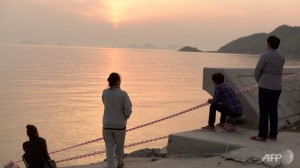Special to WorldTribune.com
By Donald Kirk, East-Asia-Intel.com
JINDO — A mother and her sister burst into hysterics, leaping up from the mat on which they had been resting on the floor of the gymnasium where hundreds were waiting for news of loved ones trapped aboard the sunken ferry boat.
The two had just seen a photograph of the boy whom they last saw alive boarding the ferry Sewol at Incheon a week earlier for a holiday cruise to scenic Jeju.
In vain, a volunteer tried to comfort them as they ran out, jumping into a bus for the 20-minute ride to the docks. A double row of policemen escorted their son’s body, wrapped in a white body bag, from the coast guard vessel to which divers had transferred it after finding it in the depths of the ferry.
No matter how resigned the relatives are to the fates of sons and daughters, they cannot overcome the horror of the finality of confirmation of death in the frantic moments as the Sewol sank off the coast of this community of rolling farmland and comfortable homes and shops beside a seascape of small islands extending to the horizon.
All day long on a glorious Easter Sunday, I saw parents and relatives waiting stoically, murmuring to one another, exchanging words of consolation, waiting and waiting.
On the crowded floor of the gymnasium and by the docks, people went through all the stages of grief. There was anger, denial, bargaining for time, overwhelming sadness and finally a certain acceptance.
You see the anger in the public protests, in the demands to see the president, in the rage over why all aboard the Sewol were not picked up much faster. Didn’t they have more than two hours to get off? Shouldn’t that have been time enough to get 475 people to the outside decks and into waiting life rafts?
Families lie together on mats and under blankets supplied by the government and hundreds of volunteers. They chat quietly, their voices low against the background of the endless news on giant TV screens on the gymnasium stage.
You sense that most of them, but not all, have come to the realization that no one left on the boat is getting out alive.
If stoicism comes to be a predominant mood, those for whom the tragedy is not so personal share something else — a national sense of shame. How could a system that has achieved so much still be so flawed as to foster such a tragedy?

The saga of the sunken ferry, from the moment the passengers heard one or two loud bumps as the vessel began to tilt, captures the essence of a people driven by the need for success but caught up by disasters blamed on overconfidence and carelessness.
Underlying the national mood, triumph mingles with guilt, outrage with greed, and issues of face and form are intrinsic in the rise to glory or the fall to the depths of despair.
The sense of guilt runs deep among those to whom profuse apologies are as commonplace as roars of victory. The suicide rate among Koreans — students who fail to get into elite universities, entertainers whose popularity falters, middle-aged workers who lose their jobs – is a national problem.
Some of the parents, waiting for clues about their loved ones, in their frenzy and agony, shout, why was the rescue so slow, why has it taken so long? They keep asking those questions long after accepting their loss.
Bonded in grief, the bereaved don’t need “counselors” to console them. They console one another while volunteers ply them with food and drink, bedding and blankets, fresh socks and underwear, soap and toothbrushes and razors — necessities for maintaining their vigil as the recovery of victims turns into a long, tedious, harrowing process.
In the end, acceptance may never come to everyone in the crowds in the gymnasium and by the docks where the bodies arrive in ones and twos and threes.
A Coast Guard sailor, in a tent marked “DNA,” tells me some people don’t want to give DNA samples, taken by swabs in the mouth, that are needed to aid in identifying bodies bloated beyond recognition.
Still more don’t like the idea of enormous cranes lifting the ship from the lower depths so divers can get in easily, see what happened and extract the last bodies. They fear that anyone still surviving in an air pocket would then drown as the capsized vessel slowly rose to the surface.
As volunteers on shore rally around their lost brothers and sisters, teams of divers, slowed down by swift currents, high winds and poor visibility in muddy waters, cope methodically.
In tragedy, Koreans take pride in coming together to recover from a disaster that is much more than a tragedy for a few hundred people. It is also a national humiliation.
Columnist Donald Kirk has been covering the tragedy from Seoul as well as Jindo. He’s at kirkdon@yahoo.com.


You must be logged in to post a comment Login